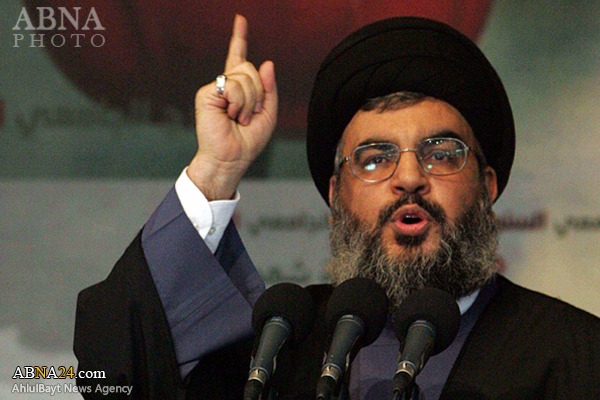Ahlul Bayt News Agency - BEIRUT: Hezbollah chief Sayyed Hassan Nasrallah held Saudi Arabia responsible for the chaos in the region, in remarks published by Al-Akhbar newspaper.
"Saudi Arabia killed us in the July 2006 war and it is responsible for all the killings in the region," Nasrallah reportedly said.
He lashed out at Riyadh, accusing it of serving U.S. interests in the region.
"It has always been hiding but now after it was exposed and bankrupt it is openly doing that," Nasrallah added.
The Hezbollah secretary-general blamed Saudis for the rise of ISIS and Al-Qaeda in Yemen, warning that the two extremist groups will later turn on Riyadh.
"Today it is blind and doesn't even care if it harms itself."
Sayed Nasrallah also discussed the devastating war imposed by Israeli regime against Hezbollah in July 2006, in which around 160 Israeli troops were perished, while 1,200 innocent people in Lebanon, mostly civilians, were killed in Israeli strikes.
"The existential danger in the region is the Wahhabi, which is trying to expand across the world," Nasrallah explained, underlining the importance of "Islamic unity."
"Takfiris and Wahabis are not the Sunnis, but they are a small part of the Muslim nation."
Turning to the conflict in Syria, Nasrallah said that "there is a chance to fortify victories and break the scheme that is plotted in the region."
"The danger still exists but we are working on driving it away," the Hezbollah leader highlighted, emphasizing that the "upcoming stage will witness triumph."
Nasrallah further referred to the recent crush of Hajj pilgrims in Mina, Saudi Arabia, saying that Al Saud’s mismanagement and its failure to learn from past lessons was behind the tragedy.
On September 24, some 4700 Hajj pilgrims, including at least 465 Iranians, died in the crush in Mina, near Makkah, when performing the Hajj rituals.
Nearly two weeks earlier, on September 11, a massive construction crane crashed into Makkah’s Grand Mosque in stormy weather, killing at least 107 people and injuring 201 others.
/129
source : Websites
Wednesday
7 October 2015
9:05:11 AM
713986
Sayyed Nasrallah: Takfiris & Wahhabis not Sunnis; Wahhabism, main threat in region; extremist groups will later turn on Riyadh

"The existential danger in the region is the Wahhabi, which is trying to expand across the world," Nasrallah explained, underlining the importance of "Islamic unity."
